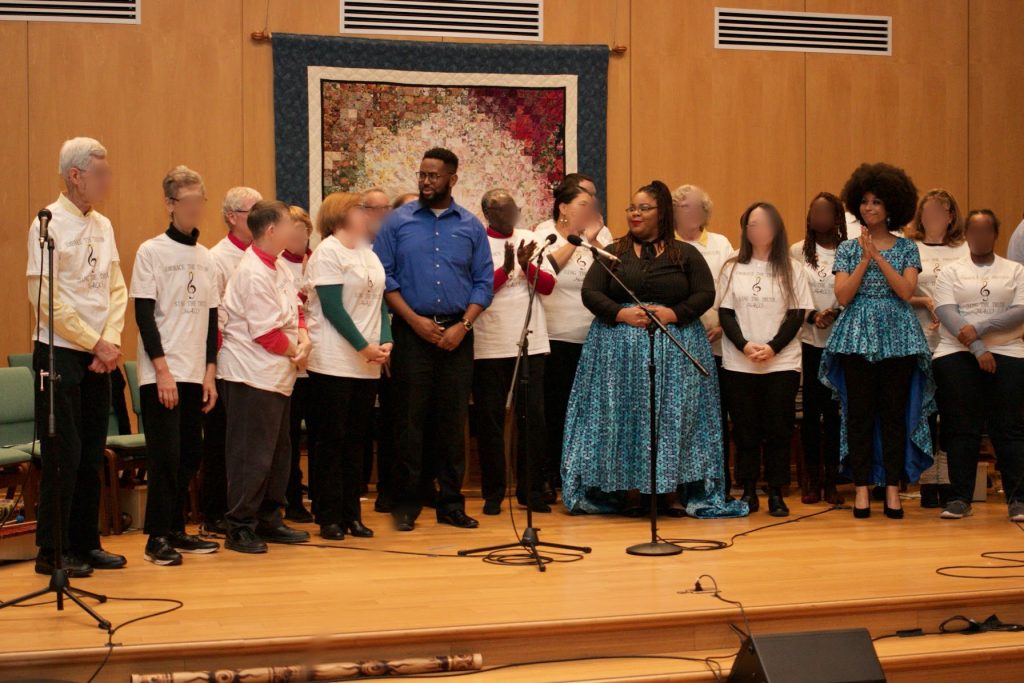Hello, everyone!! Wow, it’s been more than a minute. Our fall and holiday season was intense as we embarked upon our research study, Race and #RealTalk: A Community Music Therapy Model for Addressing Racism in the United States, which culminated into another public Race and #RealTalk performance on December 15.
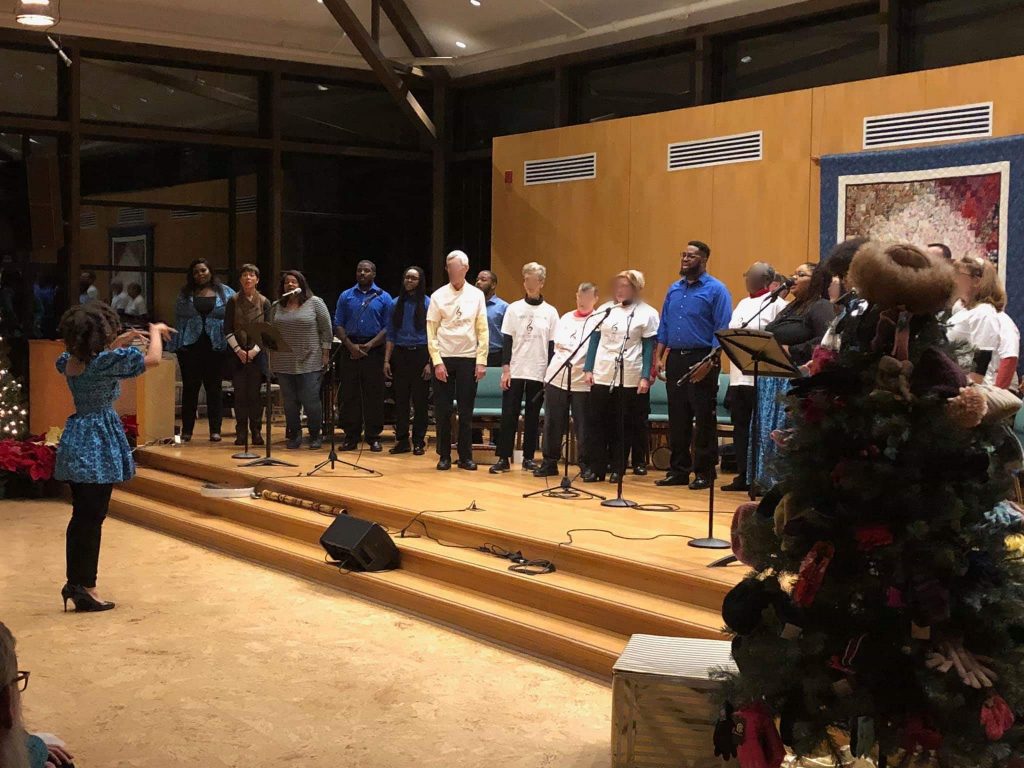
(faces blurred for confidentiality)
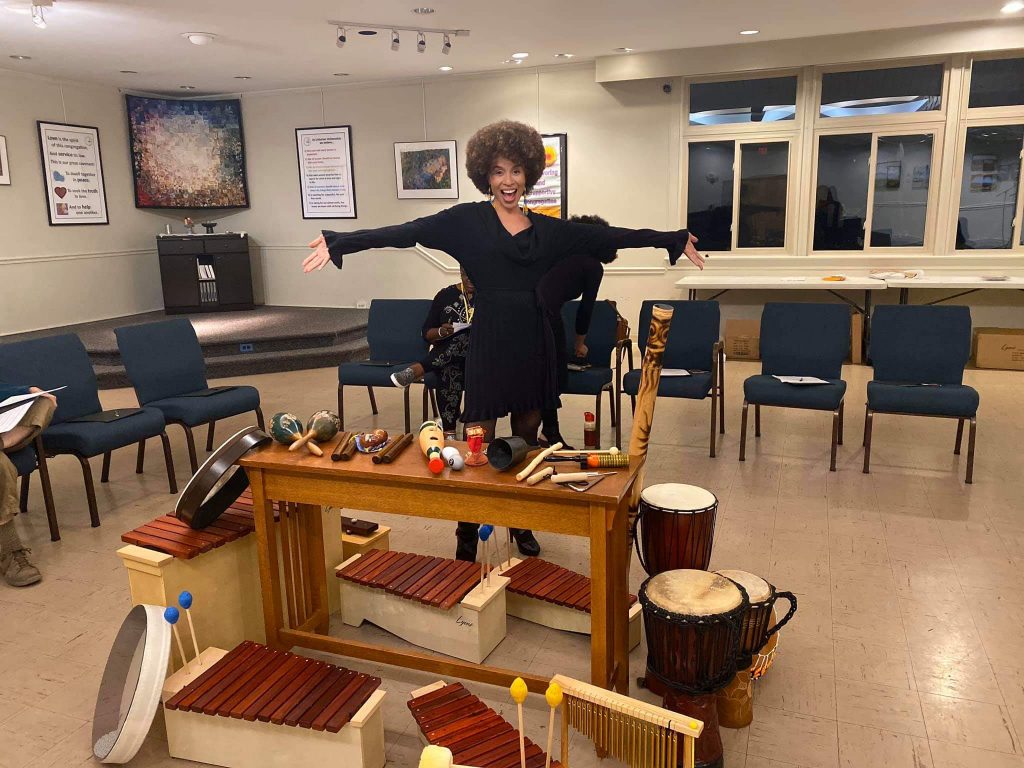
Our series was focused on “Immigration: Engaging Across Political Perspectives.” And in addition to using our barbershop metaphor– this time, we also used instrumental improvisation with percussion throughout the series to explore the dynamics of our relationship to one another when we are sharing the tension of such a difficult and complex topic. What we share here can only be but brief snapshots of an intimate and confidential process. And we hope that what we can share will provide a glimpse into what has been truly meaningful work within everyone who was involved.
Each session, we explored a different “voice part” perspective of the issue together. Starting with the bass line- why are we having this conversation about immigration today? How does racism start to come into play? By now, some of you reading may wonder, are we still actually even having this conversation? In the past couple of months– even weeks– much of our attention has been for the most part diverted to other matters: from Prince Harry and Duchess Megan Markle’s withdrawal from the British monarchy to the tug of war in the impeachment trials. But what we learned is a reminder that the transience of current events does not obliterate the relevance of issues from which we become detached, sometimes due to the seductive influence of the media.
We read a piece which was an exhaustive timeline over the span of a century, documenting the United States’ involvement with government and military forces in South American countries Honduras, El Salvador, and Guatemala. This century’s worth of events which contributed to a complicated narrative– distilled to a 7 page article provided a context of today’s debate concerning the destabilization of these countries’ economies– is not much, if at all, factored into the battle of today’s political arena. It certainly left many of us with much more questions than answers about the crisis we’re facing today, which has been profoundly influenced by many administrations before this one. Perhaps the reason this conversation is necessary is about more than the surface of current events thrust into the media today– even as these still current events have receded into the background of the political dramas of the Western world.
Then it was time to “Listen to the Lead.” Who are some of the people living the realities of today with respect to immigration policy and enforcement as targets of these policies? We watched episodes of the Netflix documentary, Living Undocumented. Before launching into our singing rehearsal, we used the percussion instruments to collectively express our different reactions to hearing and witnessing these stories. The music was agitated, tense, less cohesive. Many participants found it quite difficult to sit with the stories of people who were experiencing very serious hardships from the applications of immigration laws. Whatever the details of a circumstance, it’s quite different from snapshots of those we’ve been respectively shaped to view as the victim or the villain in these matters to look into a person’s eyes as they tell their stories in real time as they’re living them. If you’ve got Netflix, give it a watch if you haven’t already… it’s hard to sit with, but nearly impossible not to take in.
We then spent our next session exploring some of the nuances of this issue in the “baritone” perspective asking “what does immigration cost us?” This is a blog, so I’ll break it to you first that the answers (yes, there is more than one) are more involved than what can be substantiated within a paragraph– and they depend on which aspect a person is measuring. A person concerned with the strain on resources may seek and find that it does, indeed cost us money as a nation to assist those coming here with little to no resources to support themselves initially. A person advocating for allowing supplemental resources to such people will also rightly find that in the long run, providing this assistance yields responsible tax-paying residents whose subsequent generations return more than the original investment. And as for the upper extensions of harmony, surveys may suggest that there are more people who are actually willing to engage and compromise on these issues and policies than we’ve been led to believe. Several folks, even surrounded by a pretty small portion of the nation’s population, expressed that they had a hard time believing this claim, even with some numbers attached to it. But there we all were– 4 weeks in to a series to do just that, approaching the peak of the holiday rush. Maybe it’s something?
In our 5th session, we broke into small groups to discuss the dialogue we’d listened to in the podcast, “This is California- Bonus Episode: Re-Pete.” In this episode, we listened to the dialogue between host and reporter Gustavo Arellano and guest and former California governor Pete Wilson over his influence with Proposition 187. This proposition would prohibit illegal immigrants from accessing non-emergency health care, public education, and other services in the state of California. It was illuminating to listen to this dialogue from the outside and consider what we were hearing from each speaker, what they were and were not hearing from one another, and what we might have asked or added to the conversation had we been a part of it. Having a context of the plural perspectives HALO’s barbershop metaphor offered to us gave us a new way of exploring the issue and listening mindfully as we practiced in engaging the subject together.
The Concert
In our concerts, we work each time to tell a story. After all, it’s the narrative above all else which tends to penetrate how we absorb our experiences as human beings– not just the facts! So we’ve interestingly started to develop a style of intermingling Barbershop and Broadway to share the story of HALO, our work with the community we’ve served through the program, the group’s journey with the music, and our collective journey through the dialogue.
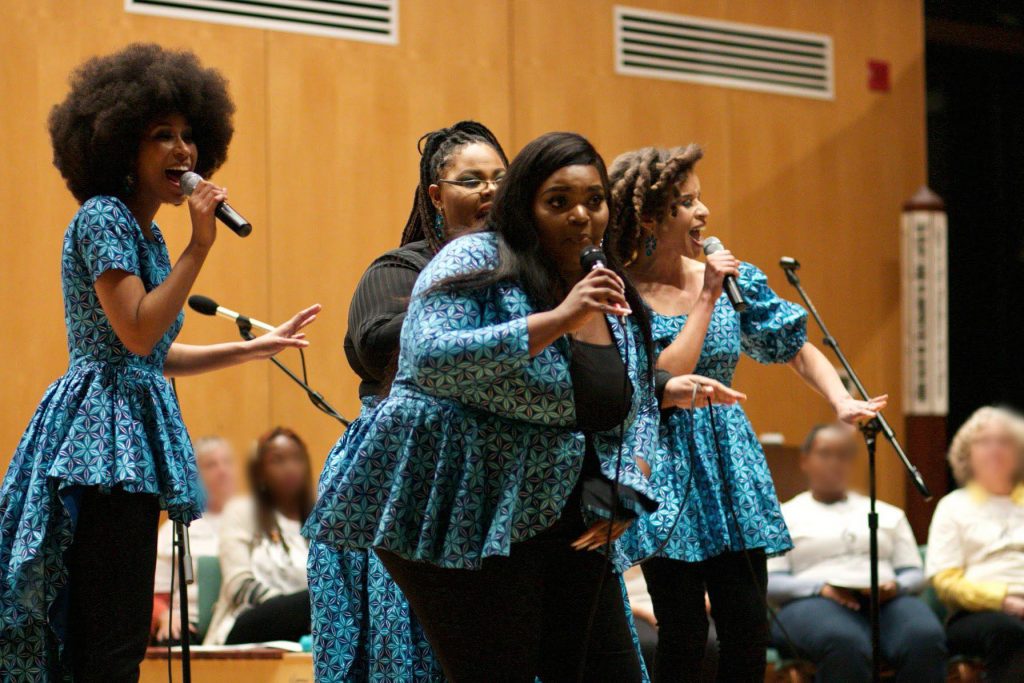
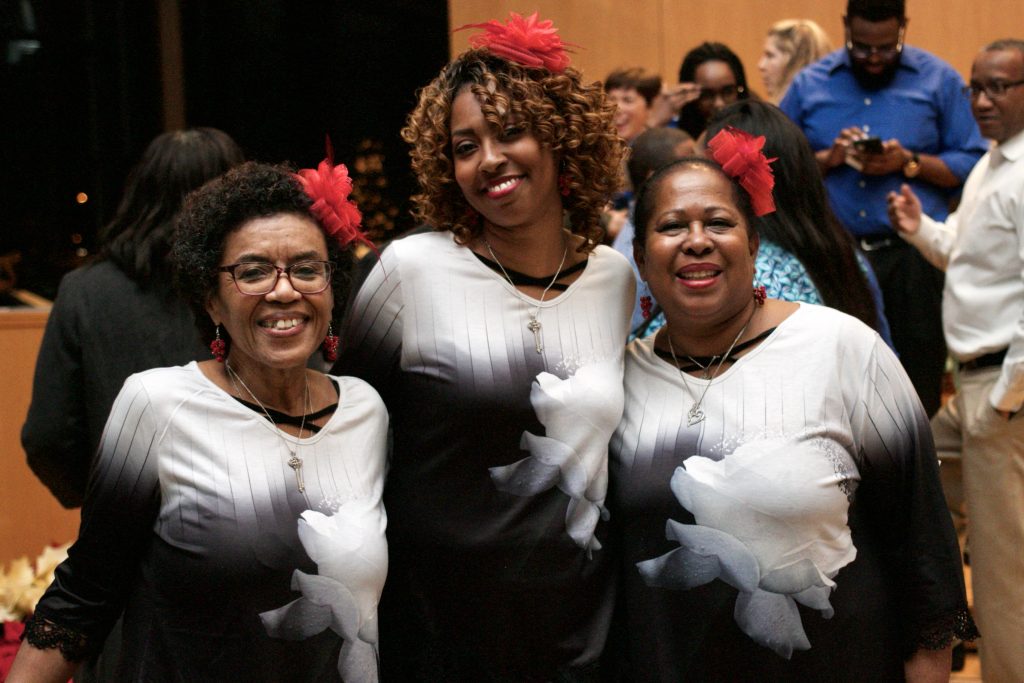
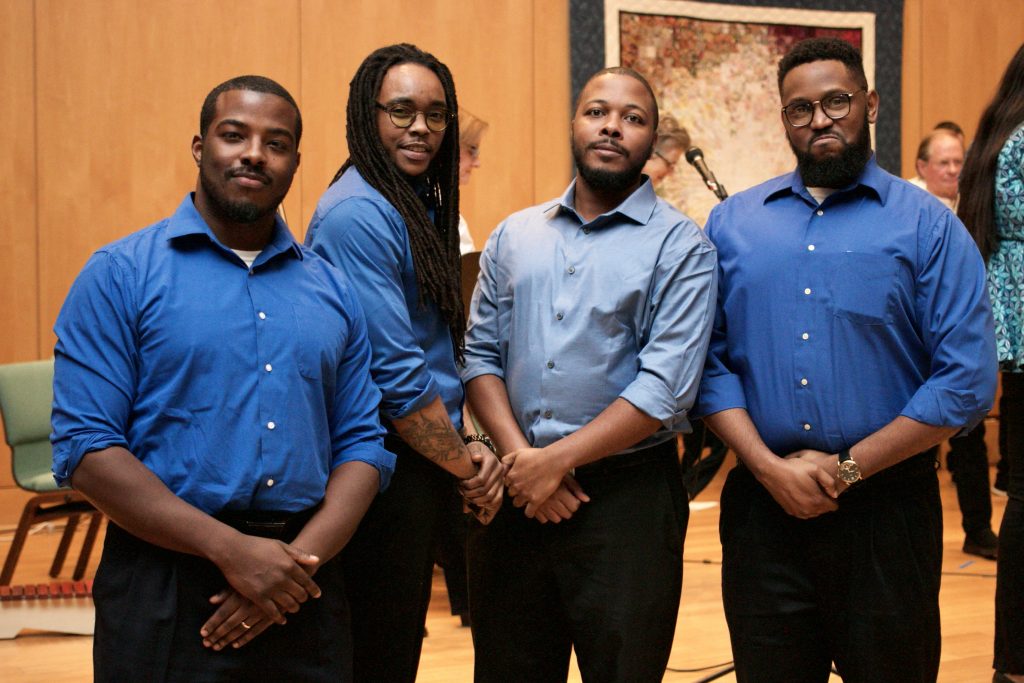
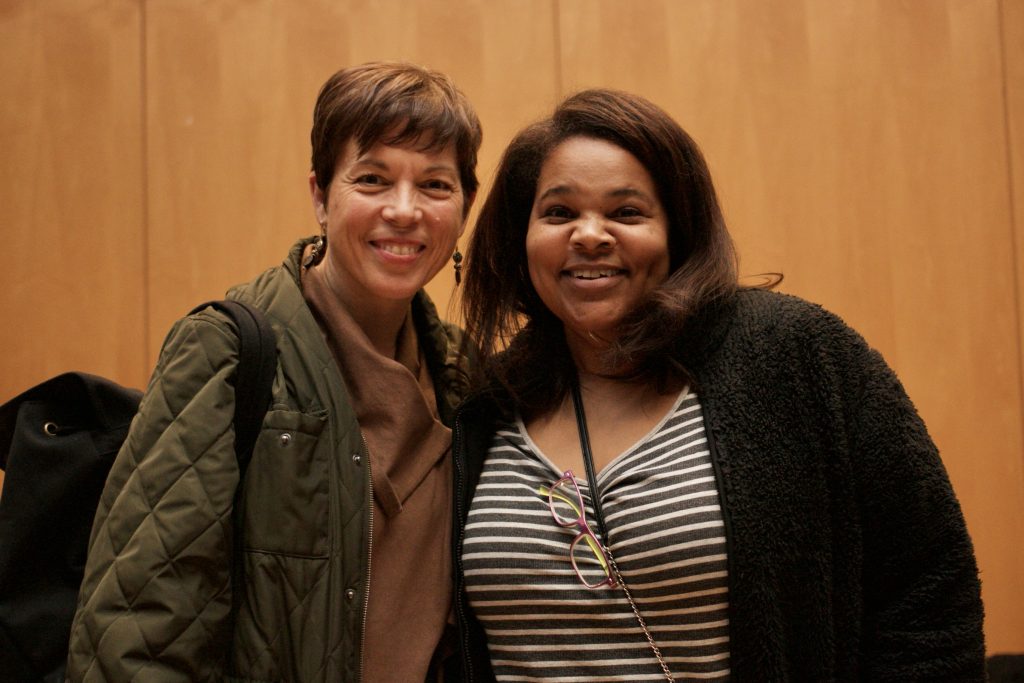
The groups that joined us were our favorite #fam quartets, Key of E and Hennessy; the powerful duo of Lisa Bromfield and Angela Bowden; and the activist quartet from DC, Strictly Vocals. Accompanying musicians Khalid Alzuoma , an astoundingly gifted prodigy of a pianist and Bronson Hoover on drums helped to bring the music even more to life!
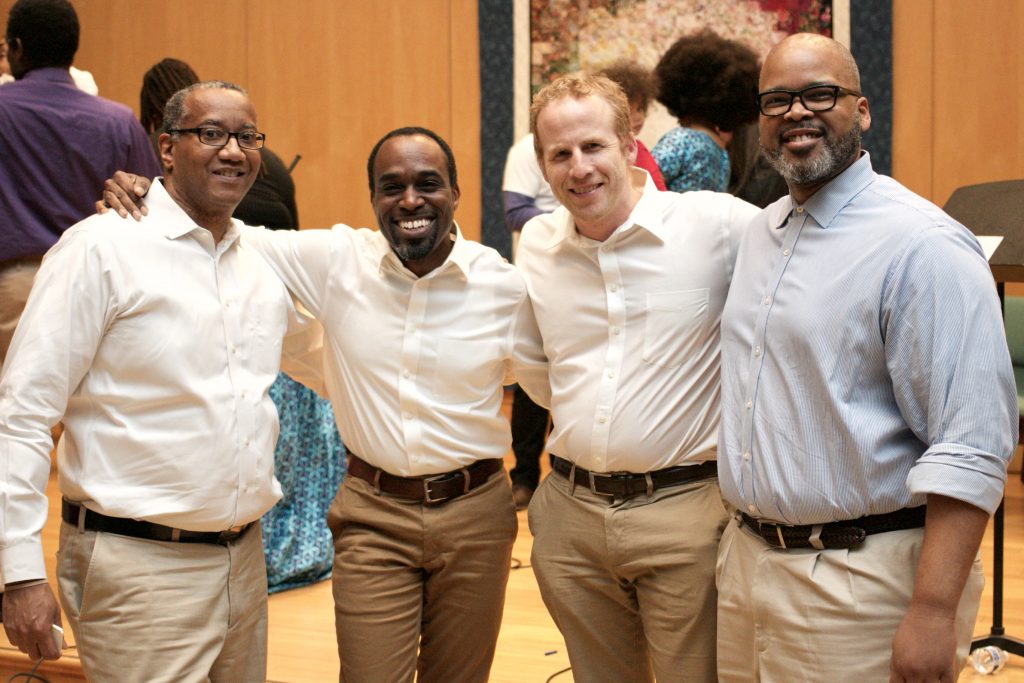
All of our music was interwoven with the spoken and musical reflections, followed by the ensemble piece, “One Voice”– our song which spoke to the progress we can make both collectively and within ourselves when we come together to #EmbracetheTension and #SingtheTruth.
The presentation was so successful that it is still being talked about in the Unitarian Universalist Congregation of Rockville’s community and beyond. At this concert, the Arts Connect organization was able to raise about 90% of their annual goal of $2000 in funds raised toward their partnering charity, Direct Support for Immigrants. It’s amazing to know that our work has impacted people not only to think and talk about troubling matters, but to act on it and make contributions to make a difference when the opportunity presents itself.
So that’s our story and we’re sticking to it. This vision of community building and healing– using community music therapy and the transformative experience of music making– has the power to change the world. So this year, believe us when we say this #HALOgrind is going to be all the way in gear. Thank you for your support on our journey- and stay tuned for what’s to come. <3
